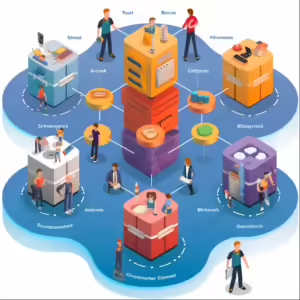Cloud computing has emerged as a revolutionary technology that has ushered in a new era of data processing and storage. With the advent of cloud services, companies and individuals can access applications, storage space and computing power over the Internet without relying on local servers or personal computers. This article provides a comprehensive overview of cloud computing, its different models, services and the main cloud platforms on the market.
What is Cloud Computing?
Cloud computing refers to the provision of computing resources (such as servers, storage, databases, network components, software, analysis and intelligence tools) over the Internet - the "cloud" - to enable faster innovation, flexible resources and economies of scale. It allows users to store and access data in remote data centers.
Core models of cloud computing
- Infrastructure as a Service (IaaS): Provides core computing infrastructure such as virtual machines, storage, and networking. Users have control over the operating system and the installed software.
- Platform as a Service (PaaS): Provides an environment for developing, testing, and hosting applications. Developers can focus on application development without having to worry about managing infrastructure.
- Software as a Service (SaaS): Provides users with access to application software and databases. The service provider manages the infrastructure and platforms on which the applications run.
Cloud computing services and applications
- Data backup and storage: Allows you to securely store data in the cloud, accessible from anywhere.
- Hosted Applications and Software: Users can access various applications and software over the Internet.
- Big Data Analytics: Provides powerful resources for processing and analyzing large data sets.
- New Application Development: Provides platforms and tools for developing, testing, and deploying applications.
Major cloud computing platforms
- Amazon Web Services (AWS): One of the leading providers in the cloud sector, offers a wide range of cloud services, including IaaS and PaaS.
- Microsoft Azure: Offers a variety of cloud services, including AI, machine learning, and Internet of Things (IoT) solutions.
- Google Cloud Platform (GCP): Known for high-performance computing solutions, big data and machine learning services.
- IBM Cloud: Offers a combination of IaaS, PaaS and SaaS and is known for its Watson AI services.
- Oracle Cloud: Strengths lie in database management and offering a comprehensive suite of SaaS applications.
Benefits of Cloud Computing
- Flexibility and Scalability: Enables companies to quickly adapt and scale their IT resources.
- Cost Efficiency: Reduces the need to invest in hardware and infrastructure.
- Accessibility: Provides access to data and applications from anywhere.
- Promoting innovation: Enables companies to react quickly to market changes and integrate new technologies.
- Downtime and control over the IT infrastructure.
Challenges in cloud computing
- Data Security and Privacy: Ensuring the security and protection of sensitive data.
- Compliance and legal issues: Compliance with data protection laws and industry-specific regulations.
- Dependence on Service Providers: Risks Associated with Cloud Computing: The Data Processing and Storage Revolution
Conclusion
Cloud computing has established itself as a key factor in the success of many companies. By providing flexible, cost-effective and innovative technology solutions, it enables companies of all sizes to remain competitive in the market. As digital transformation continues and the use of AI and machine learning increases, the importance of cloud computing will continue to grow as it enables companies to integrate new technologies quickly and efficiently.





